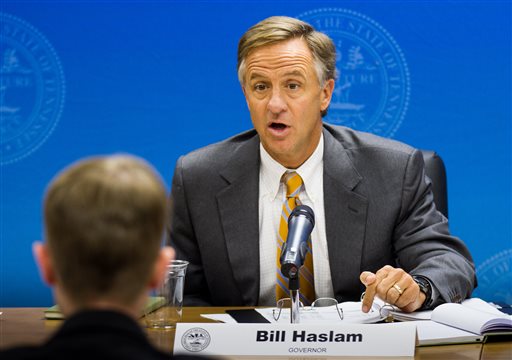NASHVILLE - They sit at the pinnacle of Tennessee's justice system, enjoying power, privileges, prestige - and even a job nearly for life, once in office.
With all the enviable perks that justices on the state Supreme Court earn, it's no wonder Gov. Bill Haslam is at a loss to explain why only five people applied for the seat being vacated by retiring Justice Janice Holden.
"I was surprised there were only five for a Supreme Court position," Haslam told reporters recently. "We don't control how many people apply."
That small pool has been whittled down to three: The Governor's Commission on Judicial Nominations, which reviews applications and conducts interviews for judicial vacancies, eliminated two potential candidates during its vetting process.
People may have been discouraged from applying by uncertainty surrounding the future of the judicial selection system, said Allan Ramsaur, the executive director of the Tennessee Bar Association.
Under the current system, the 17-member commission - composed largely of lawyers including former U.S. Attorney General Alberto Gonzales - presents three candidates to the governor, who makes the final selection. The system works for all appellate courts, including the Supreme Court.
But a proposed amendment to the state constitution would change all that: there would be no requirement for a selection commission, leaving the governor to recommend whomever he wants. The state Legislature would also be granted the power to reject the governor's nominee.
Vanderbilt University Law School professor Brian Fitzpatrick says candidates for judgeships are scared off by the way court vacancies are now filled.
Anyone can apply to fill a judicial vacancy, and written applications and interview by the commission are open to the public. The panel then then selects three finalists to forward to the governor. Once appointed, the judge or justice then stands for a yes-no retention vote - which has led to the defeat of only a single appeals judge since the system has been in place.
Fitzpatrick said the public nature of the process is something that can make potential candidates uneasy.
"One of the real downsides of the commission system is that you have to make it known that you're seeking a judgeship by applying," said Fitzpatrick. "Because if they don't' get the job, it looks bad for them."
Fitzpatrick says he supports the proposed constitutional change to give the governor the authority to nominate whomever he likes without any public scrutiny before he makes his choice.
The Tennessee Bar Association wants the current process to stay in place, arguing that it results in a pool of high caliber candidates.
"Merit is the most important element here," Ramsaur said. "If you get the top talent then you don't need to have a whole lot of folks to be real selective from," he said. "And I think you do have some very strong candidates there to choose from."
If voters don't approve the constitutional amendment next year, it's unclear whether lawmakers would instead move away from judicial appointments and toward popularly contested elections.
Four of the last six appointees to the Supreme Court are former appellate judges. Holder was a Memphis circuit judge and Justice Cornelia A. Clark was the director of the Administrative Office of the Courts before their appointments to the high court.
The last six Supreme Court vacancies have drawn an average of about 11 applicants, with seven being lowest previous number applicants among them for the most recent opening filled by Sharon G. Lee in 2008.
Holder's departure next year creates the first Supreme Court vacancy for Haslam to fill since he took office in 2011. Holder was appointed by then-Gov. Don Sundquist, a Republican, while the remaining four justices were appointed by Haslam's Democratic predecessor, Phil Bredesen.
The candidates now under consideration for the high court position, which pays $177,000 a year and includes membership in the generous state retirement plan for judges, are Criminal Court Judge Chris Craft, Court of Appeals Judge Holly M. Kirby, and corporate attorney John Lathram. All three are from Memphis.
Craft has been a criminal judge in Memphis since 1994 and is also the chairman Board of Judicial Conduct. Kirby, the lone female finalist, was appointed to the Court of Appeals by Sundquist in 1995. Lathram is a member at the Bass Berry & Sims law firm, where his practice areas include commercial litigation and white collar crime.

